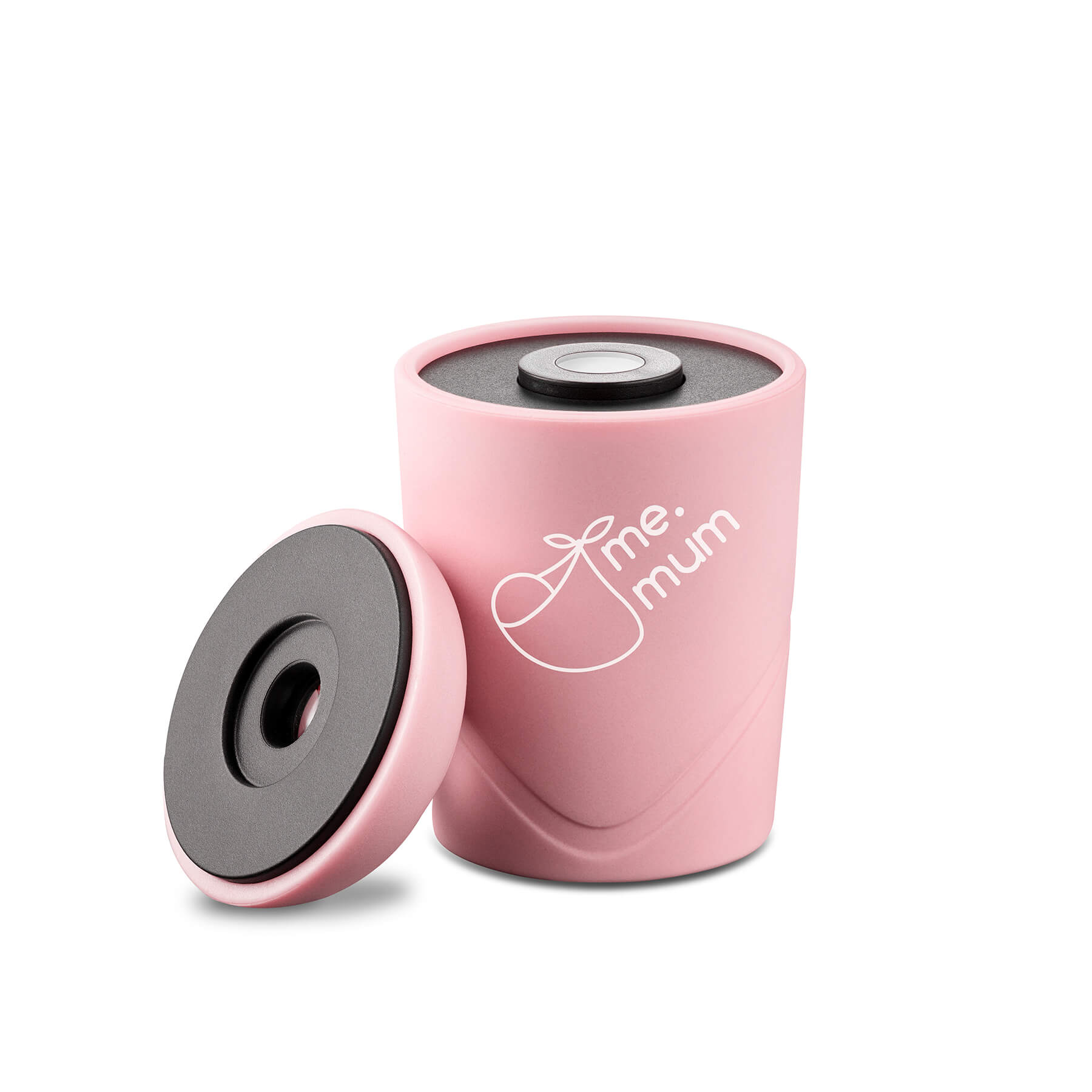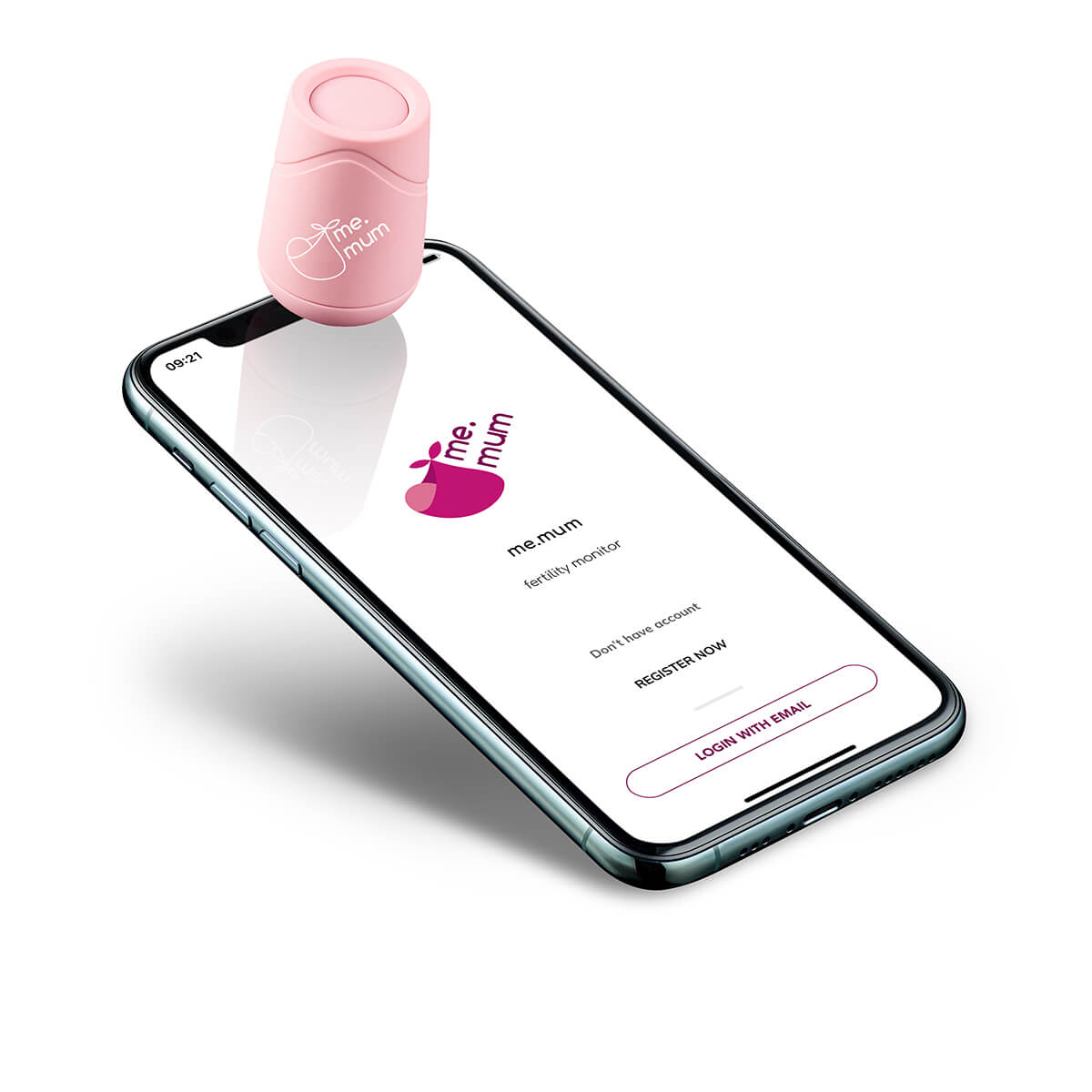Predicting Fertility Is Now Easier than Ever: Meet the Revolutionary me.mum!
May 24, 2021 - The new method, me.mum, only needs a drop of saliva for analyzing hormones and predicting fertility. The project aims to present a reliable solution for all women and couples who are planning a pregnancy or trying to conceive but are experiencing difficulties.
As we hear about the latest technological advances and discoveries, the first thing that comes to mind might be a Tesla truck or a new social network available in the app store. Thus, we wonder, what purpose does technology serve? We believe, therefore, that today's progress in the technology industry is dictated by the latest trends, whims, and social needs of the human being (and it is worth clarifying that it is not all bad).

me.mum
But it also depends on where we look, because not every day people and ideas appear willing to change the course of, for example, the way we know about family planning and predicting fertility. A Croatian entrepreneur, based on her life experience, decided a few years ago to take action on the matter and revolutionize the way in which women can better know their bodies and plan the desired pregnancy with their partners through an innovative method, and it only requires an easy-to-use device and a mobile application.
In 2015, after two years of expectations, disappointment, and hopes, Maja Bujas felt pushed towards four years of developing me.mum, which is an innovative portable fertility monitor and app that can accurately predict women's fertile days by analyzing the levels of luteinizing hormone (LH) from saliva. Its technology is built from scratch, and provides personalized insights into women's hormone profile, and detects the most fertile days, which significantly increases the chance of conceiving. Chances of getting pregnant are higher when women can identify their fertility window. me.mum combines the most popular methods of determining the fertile days: period calendar and measuring luteinizing hormone (LH) from saliva, instead of urine.

Maja Bujas, founder of me.mum
After conceiving the idea, the research and development stage followed. In 2017, the first functional models and app were designed. In the two following years, two prototypes of me.mum were developed, and in December 2020 the final product was completed. That way, after four years of development and two prototypes, Maja can finally share one simple to use solution for all women and couples who are planning a pregnancy or trying to conceive but experiencing difficulties. When you are trying to conceive, the most important thing is to determine your fertile days. With me.mum you will do it easily and simply.

Its use is very practical and easy to learn for all those interested in predicting fertility in few steps. The best time to use me.mum is in the morning, but you can use it during the day too. Before using, it is important not to eat or drink anything, except water. That way your saliva will be clean. According to Maja and her team of developers, the process of using me.mum can be summed up in only three easy steps!
Currently, the product is already on sale in the early-bird mode, in which all those interested in buying it can access an exclusive price. The market price will be €119, but at this time one can order it through two packages: one for €59, which includes the smart fertility monitor device and the me.mum app. The other, for €69, also includes an online nutrition course for boosting your fertility. The estimated shipping date worldwide will be July 2021. The app will be available as soon as the first me.mum devices are delivered.

Likewise, the me.mum crowdfunding campaign is still in effect, with 25 more days for all those willing and interested in collaborating with its developers, who would like to hear feedback from the early users and grow the me.mum community. Also, through their crowdfunding site, you can learn more about me.mum, the team behind its development, how to use it, any updates in purchasing and shipping, and more!
For more, follow Made in Croatia.
Aconno Startup from Düsseldorf Opens Offices in Zagreb and Osijek
The IoT startup Aconno from Düsseldorf, Germany, opens offices in Zagreb and Osijek.
As Poslovni Dnevnik/Bernard Ivezic writes on the 3rd of September, 2019, after large and medium-sized technology companies from Germany started to show an interest in Croatia, development departments started to open here as well.
Croatian-German IoT startup Aconno, headquartered in Düsseldorf and working for companies like Vodafone, Bosch, Siemens, SAP, NKT and Deutsche Telekom's T-Systems, has just opened two development offices in Croatia. They will work on developing software and hardware for their IoT (Internet of Things) solutions.
Currently, the startup employs ten employees and initially plans to hire another fifteen IT professionals in both Zagreb and Osijek.
Miroslav Šimudvarac, co-founder and CEO of Aconna, which also runs the Troido software company and organised the largest Android conference in Southeast Europe in Zagreb, Droidcon, says he understands that the job market is under a lot of pressure, but also that they do have some very good experience with developers from Croatia .
“People in Croatia deliver what they say they're going to and their work is of high quality. We would love to be able to hire IT experts in the next few weeks, but we'll be pleased if we can complete the teams by the end of the year,'' says Šimudvarac.
He adds that they have decided to develop their business in Croatia because they want to enter into larger development projects with Zagreb's FER. The faculty sought a much more formal relationship for such cooperation, which included having a company registered in Croatia so that they could engage in larger and more complex projects and deal with it in financially better manner.
"Our cooperation with FER is so good that I can say that it's difficult to find such a partner in Germany in the academic world," says Šimudvarac.
Finally, he says they are considering moving part of the production of IoT devices to move from Germany to Slavonia. Šimudvarac says that it is crucial for them to produce in the EU. He points out that this is not the cheapest option, especially when compared to China.
''But production in the EU, so in Germany and Croatia, is the most optimal when it comes to speed, quality and price, and especially flexibility, because for example in Croatia there are very good craftsmen who can quickly deliver smaller series' of elements that we incorporate into our IoT devices,'' says Šimudvarac.
He states that they have opted for this expansion because Aconno has entered a new development phase. ''After four years of bespoke projects and 1.2 million euros invested in R&D, we have amassed a portfolio of about thirty of our own finished IoT products,” says Šimudvarac.
Aconno is the first commercial user of NB-IoT technology in Croatia. Šimudvarac explains that in April last year, Croatian Telecom (Hrvatski Telekom) launched the first NB-IoT network in Croatia, and Aconno immediately established the first commercial connection for the needs of a R&D project working for one client on that network.
"Because of the NDA contract, I can only say that it is a kind of portable panic button, or alarm. The point is that the user can carry it everywhere, charge it once or twice a year, and in the event of an emergency, can send their exact location to the cloud, or to the Internet, from anywhere, even from their basement or an elevator,'' says Šimudvarac.
He adds that they tested this IoT device in the centre of Zagreb and that it worked flawlessly. Afterwards, he points out, it was also presented in Berlin, where they were able to send a signal even from the Metro, again using NB-IoT.
He states that they use other wireless technologies, such as LoRe, Sigfox, BLE, WiFi, as well as other classic telecom networks used for IoT data transfer, such as 2G and 3G. Both he and his business partner, Thomas Hollwedel, a former Vodafone manager, say a turnaround took place this year in the IoT market.
"We have been on the market for four years, but now we're getting orders for tens of thousands of IoT modules for the first time. We are currently negotiating a deal that, if passed, would mean that we would be delivering 500,000 IoT devices annually at a cost of 30 euros per piece,'' explains Šimudvarac.
He explains that such interest in IoT is not concentrated solely in Germany. Clients, he says, come from other parts of the EU, then from North and South America and Africa. This is also reflected in the business.
''In its second year in business, 2016, Aconno was a plus-size business. In 2017, we had 400,000 euros in revenue, and next year we expect to reach 1 million euros. It's a rough projection because just one client can increase it further,'' says Šimudvarac.
The prerequisite for such growth is, as they interpret, that they have developed their own IoT technology. Aconno was one of two companies in the world to start developing technologies based on Google's IoT concept, and subsequently developed their own IoT software for it.
The software, says Šimudvarac, was put into open source and anyone can freely use it to create their own solutions.
''This is how we work with some twenty universities in the EU and in North America, but also with startups. Once, in just ten days we made a prototype of a smart cube, with which we received an investment of 1.7 million euros,'' concludes Šimudvarac.
Make sure to follow our dedicated business page for much more.
First Time at Italian ScaleIT Conference for Successful Croatian Startup
The presentation of this Croatian startup from Sveta Nedelja in Italy is due to its encouraging levels of success and the realisation of organisers that Croatia boasts a quiet but rather promising startup scene, despite all of the negative headlines.
As Bernard Ivezic/Poslovni Dnevnik writes on the 29th of May, 2019, one of the largest Italian startup conferences, ScaleIT, opened up for new companies from the Republic of Croatia for the first time this year. ScaleIT is an event that brings together fifteen of the most successful startups, mostly from Italy but also from abroad, and connects them with more than seventy VC funds and 150 active business angels.
Lorenzo Franchini, the founder of the ScaleIT program and the founder of the Italian Angels for Growth business association says that due to the eighty million euro Hyundai investment in Croatia's wildly successful Rimac Automobili, headed by Mate Rimac, he is now aware that there are also promising scaleups and other rapidly expanding businesses located in neighbouring Croatia.
"Inspired by the story of Rimac, who has collected more than one hundred million dollars from major international brands such as Hyundai, Kia, Porsche, Camel Grupai and others," stated Franchini.
He added that ScaleIT is looking for startups who want to expand onto international markets and need between three and thirty million euros in capital.
"We create a healthy balance of more than ten investors per single scaleup, and in the last three years, we've secured more than 230 million dollars in capital," said Franchini.
Among the group of investors who will listen the pitches of fifteen of the best startups are investment houses such as Accela, Cisco Investment, EarlyBird VC, Eight Roads, Holtzbrinck Ventures, Index Ventures, Iris Capitals and Partech Ventures, as well as companies such as Euronex, AWS, to Salesforce.
Over the past several years, the aforementioned Italian conference has successfully attracted startups from Slovenia, Bulgaria, Macedonia, Greece and the Czech Republic, in addition to those from Italy.
Make sure to follow our dedicated business page for much more on Croatian companies, Croatian startups, Croatian products and services and the general Croatian investment climate.
Click here for the original article by Bernard Ivezic for Poslovni Dnevnik
Croatian Startup and Entrepreneurship Discussion in Koprivnica
''The most important thing is to have a clear plan and a vision and to be persistent and never give up, because every good idea will find its way to a buyer,'' this was the message sent out to those thinking of becoming Croatian entrepreneurs.
As Ivan Tominac/Poslovni Dnevnik writes on the 18th of April, 2019, an event organised by Vecernji list and Poslovni dnevnik has the ultimate goal of which is the retention of young educated people in Croatia, and after Osijek, the event will move to Koprivnica, two continental Croatian regions which are often overlooked.
The event will include a tender for student development projects, round tables and forums entitled ''Future in Croatia'' which will be held across six Croatian cities in cooperation with six universities and a traveling exhibition to mark the the occasion of the 60th anniversary of Večernji list. In Koprivnica, the event will be held in cooperation with the North University on Tuesday at 10:00. Croatia's Minister of Tourism Gari Cappelli will give his view of Croatia and available opportunities, and before that, the event will be bringing two stories from Koprivnica that prove that you definitely can succeed in Croatia.
Boris Poljak, the owner of the Pobis company, noted at the very beginning of the conversation that entrepreneurship is not easy but challenging as the market does indeed offer countless possibilities, but whether or not we're successful is down to nobody and nothing but us.
"Being an entrepreneur depends on the person, and not on the place he's in. If one has the will and the desire to be an entrepreneur, then he won't care whether he's doing it in Croatia, Austria, Germany, or elsewhere," Boris Poljak said. For success, it's important to abide by the established plan and rules of the game, ie, certain legal frameworks.
According to him, young people aren't going straight into business today, but instead, they're moving into ''entrepreneurial waters'' because they want to ensure a secure existence for themselves. "The statistics on the opening and the closing of companies is proof of this. Unfortunately, many people don't succeed, but there are many who do succeed and who achieve excellent results here, and more and more are doing so internationally. Running your own business today doesn't require that much capital," Poljak stated with a short and clear message that says that without a clear plan and vision there can be no success.
"You have to work really hard with young people, they're most often not prepared for work and have a lot of prejudices towards employers," emphasised Poljak, adding that in his company he recognised that with the effort and investment poured into young people, he was creating quality staff who could compete on the world market level. Young people are increasingly involved in entrepreneurial ventures, and as a result, there are numerous startups popping up all the time across Croatia, leading to more tenders and investments.
Codebox managed to stumble upon such a welcome fat, the core activity of this organisation is the creation of personalised software, web design, computer equipment maintenance, and processing and data transfer. Martin Kolarić and Filip Stojić began on this path through a startup tender, and today they can safely say that it was a great opportunity to gain new experiences, try out their knowledge and skills and also have some fun.
"For all those who want to be successful, our advice is to work on themselves and their knowledge. A great deal of information is available to all of us and we have the opportunity of continuous learning and training. Innovation and creativity are the most important competencies today, which is why we need to work on our own improvement, this is the only path to real success,'' concluded Martin Kolarić.
Make sure to follow our dedicated business page for much more.
Click here for the original article by Ivan Tominac for Poslovni Dnevnik
Croatia's Nocturiglow Begins Creating ''Low Tech'' Products for Elderly
As Bernard Ivezic/Poslovni Dnevnik writes on the 14th of April, 2019, Croatia's Nocturiglow is currently the biggest startup ''surprise'' in the Republic of Croatia. The story of this startup, which won best pitch at the first Investors Conference @ Algebra Lab, has accelerated beyond all possible expectations.
The Nocturiglow team has developed a low-tech care product for the elderly and infirm which has the same name as the company itself, for those who struggle to get up to go to the bathroom to urinate, or for those who simply cannot for whatever reason. The only, conditionally speaking that is, "technological" thing that Nocturiglow's ''bowl'' possesses is that it has fluorescent elements which make it glow in the dark, which is why it's easy to locate and use during the night. There is a female and a male version.
Nocturiglow's Ivan Babić politely declined to show an image of the design of Nocturiglow's new product, because he is currently in the process of having this intellectual property protected for sale on the EU market.
"We're completely low tech. That was our whole goal, because our competition doesn't focus on quality and user experience, and that's why we think we have room for success," Babić says. He added that Nocturiglow will develop other care products aimed at the older generation in the future, and they will also incorporate sensors, which of course means adding more technology.
Like most millenials today, unsatisfied with the potential income and opportunities that he could accomplish with a master's degree in logistics and management here in Croatia, he was looking for a stroke of luck which would take him down a different path, and so he left Croatia. For three years, he worked as a carer for people with disabilities over in Germany, a job which helped him arrive to this idea in the first place.
"When the STEP-RI startup incubator issued a tender, I applied, I resigned from my job in Germany and came back to Croatia to develop my own business," Babić says. In the past six months, he has made a prototype on his computer with his partner Sara Gunjača and his designer, Ivo Blažinčić.
Now he is preparing to create the very first functional prototype. His plan is to make fifty copies to be shared by test users. Previously, this type of thing was tested through surveys among employees of private and public healthcare institutions.
"We have also noticed that our product is not only good for patients but also for healthcare institutions, because it facilitates jobs for caregivers, as well as insurance companies," added Babić.
He noted that he wants to start selling Nocturiglow's brand new product through his own web store by the beginning of 2020, while the ''attacking'' the EU market through Amazon. He also wants to develop sales to various healthcare institutions. He has even been in talks with an American company, a partner of Kickstarter, about production. Currently, however, investors haven't come knocking at his door, yet.
Make sure to follow our dedicated business and Made in Croatia pages for much more.
Click here for the original article by Bernard Ivezic for Poslovni Dnevnik


